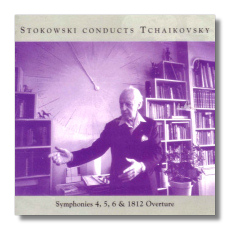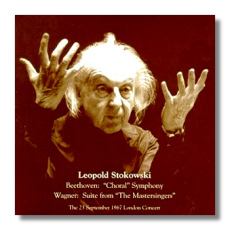
The Internet's Premier Classical Music Source
Related Links
- Latest Reviews
- More Reviews
-
By Composer
-
Collections
DVD & Blu-ray
Books
Concert Reviews
Articles/Interviews
Software
Audio
Search Amazon
Recommended Links
Site News
 CD Review
CD Review
Leopold Stokowski Conducts

Piotr Ilyitch Tchaikovsky
- Symphony #4 in F minor, Op. 36 (1878) *
- Symphony #5 in E minor, Op. 64 (1888) **
- Symphony #6 "Pathétique" in B minor, Op. 74 (1893) ***
- "1812" Overture in E Flat Major, Op. 49 (1880) * ***
* Japan Philharmonic Orchestra/Leopold Stokowski (8 July 1965)
** American Symphony Orchestra/Leopold Stokowski (4 December 1967)
*** London Symphony Orchestra/Leopold Stokowski (21 April 1973)
**** Royal Philharmonic Orchestra/Leopold Stokowski (15 June 1969)
Music & Arts CD-944 2CDs AAD


The 21 September 1967 London Concert
- Ludwig van Beethoven: Symphony #9 "Choral"
- Richard Wagner: Suite from Der Meistersinger
Heather Harper, Helen Watts, Young, McIntyre
London Symphony Orchestra/Leopold Stokowski
Music & Arts CD-943 Stereo 23 September 1967
Okay, there's good and bad news here. Let's get the grousing out of the way first. The Tchaikovsky set has two problems. First, the Pathétique's final movement is shorn from the first disc and placed at the beginning of the second. I hate it when that happens. To my ear it would make more sense to break the 5th off somewhere. Having to get up and switch discs to hear the final movement of the 6th breaks my concentration. Still, I can live with this given that this also happens to arguably be the finest Pathétique by Stokowski, or anyone. On the other hand, the 5th Symphony is another problem. It sounds as if it was transferred off-pitch. The strings are strident and steely. A sharp cut in the treble helps matters somewhat, but it is still a problem. On the other hand, this is also another excellent performance.
Now the rest is good news. Let me start in order. Stokowski recorded the 4th Symphony three times in his life. All three are currently on CD. I have said elsewhere that each time Stokowski recorded this symphony it got weirder. The most Tchaikovskian of the three was the first, with the Philadelphia Orchestra. Interestingly, this Japan Philharmonic has almost the same timings as that first recording. Like it, too, this performance is less willful and mannered. It is also exciting, as much as the NBC Symphony Orchestra recording which was faster. The sound here is good and detailed. In short, arguably the best recording around of Stokowski and this piece.
The Fifth is on the second CD. I have already commented on the sound here, which is unfortunate. The more so because this is really an exciting performance. The last movement, in particular, has a force to it unlike any of Stokowski's recorded performances. I sometimes wonder if Stokowski wished the last movement of the Tchaikovsky 5th was his "signature" piece instead of the Bach/Stokowski Toccata and Fugue. It opens another Stokowski movie, 100 Men and a Girl, and also in other programs I have watched. The finale, for the tyro in Stokowski lore, Stokowski eliminates the false ending, leading directly into the 'real' coda. (I remember watching the opening of 100 Men and a Girl. One 'member of the audience' is following the score as Stokowski does the Tchaikovsky 5th. I often wondered if this was some inside joke on Stokowski's part.)
As I have already said, the Pathétique is absolutely emotionally draining. At the very opening I am sucked into this world. It is an almost metaphysical experience. The storm of the first movement is powerful and its fading away makes me think that Shostakovich may have been echoing it in the coda of his Eighth Symphony. The middle two movements are exciting and melodic. The finale is tragic without being maudlin. It is worth the price of this set just to hear this performance.
The 1812 Overture, like the Fifth and Sixth Symphonies, was from a live concert just preceding the commercial recordings (for Decca and RCA respectively). This has previously been released on Music and Arts, differently coupled. Even sans the cannons and fireworks, this performance is more exciting than the studio recording. The sound is good and everyone seems just to be having a good time.
Now, I have really been trying to say something good about the Beethoven CD. I listened to it on different equipment, fiddled with the treble, tried it with and without headphones. Like much of the Tchaikovsky in the set above, these performances are from concerts preceding commercial recordings (with Decca, again). The timings are consistently somewhat faster. The trouble is that the sound is horrible. I hesitated before settling on that word. The FM hiss muffles a lot of detail. More bothersome is that it seems to have been transferred off-pitch. The winds, in particular, have a reedy, almost kazoo like sound to them. The strings are malnourished. The bottom line is that I cannot recommend this disc. Not even the most devoted Stokowski fan would appreciate this disc. It is too bad. I really anticipated listening to this. I hope that Music and Arts can recall them and remaster the sound. In the meantime, BBC Radio Classics may issue this in better sound. I certainly hope they will. In the meantime, the commercial recording is (or was) available on the Weekend Classics series. It will also be released on London's Phase 4 line sometime in 1997. That performance and recording is gripping.
Copyright © 1995, Robert Stumpf II




















